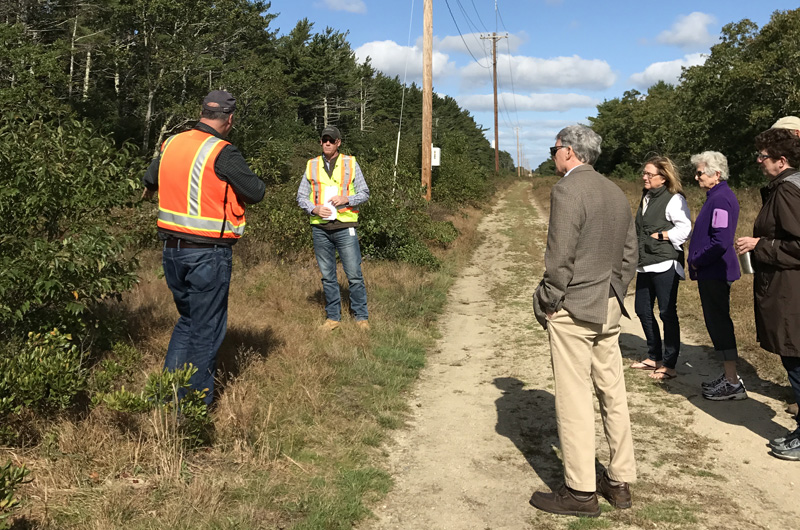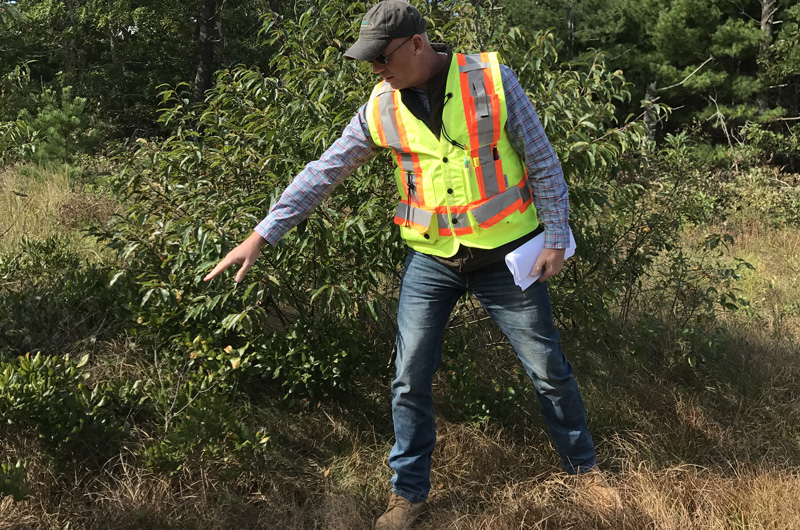Eversource Energy’s plans to spray herbicides under power lines on the Vineyard remained in the spotlight this week as Tisbury selectmen were stymied in an effort to take legal action against spraying in their town.
On Thursday Eversource officials traveled to the Island to meet with Edgartown selectmen and other officials, who had requested a meeting to learn more about the plan to resume spraying this fall.
Eversource uses herbicides to manage vegetation under power lines and on rights of way. The spraying has been controversial on the Vineyard, with town selectmen, the Martha’s Vineyard Commission and the Vineyard Conservation Society all speaking out against it and writing letters to the state agriculture board.

Tisbury was dealt a setback this week after learning they could not go to court to seek a temporary restraining order against the utility company. The town selectmen voted to pursue court action two weeks ago, following in the footsteps of similar action in Brewster.
Last week Brewster’s appeal to block the spraying was dismissed for lack of standing. A hearing scheduled for Friday before the state Division of Administrative Law Appeals has been cancelled.
At the Tisbury selectmen’s meeting on Tuesday, town administrator John (Jay) Grande said the town had no standing to pursue an injunction, repeating advice he had received from town counsel. The reason is that Tisbury did not participate in an effort to overturn to the 2017 yearly operational plan of the state Department of Agriculture, Mr. Grande said.
With herbicide treatments expected to start in the coming weeks, town officials said they will turn their focus to the future, though immediate legal action is not off the table.
“We need to prepare for next five-year [spraying] agreement and how to respond to that,” Mr. Grande said.
Selectman Tristan Israel agreed. “We need to point toward 2018 at this point, and develop some stronger tools,” he told the Gazette later.
Those tools could include a home rule petition to regulate herbicides, which could come before the annual town meeting in the spring. The town board of health has listed chemicals that will be used, including Arsenal, Rodeo, and Krenite, on the town website and is looking closely at laws that regulate pesticide and herbicide applications.
State Sen. Julian Cyr has filed a bill that would give communities more control over spraying decisions, but the bill and other related ones have been stuck in committee since last January.
Tisbury health inspector Maura Valley said she has identified 140 properties in town that abut Eversource power lines running through residential areas.
Ms. Valley said the board of health and the selectmen plan to meet with abutters to discuss possible future solutions, including having property owners or the town take on the responsibility of vegetation management.
Tisbury selectmen expressed frustration with the lack of dialogue with Eversource.
“I don’t like it,” selectman and board chairman Larry Gomez said. “I mean, jeez, we can write as many letters as we want. We’re not getting any response.”
Mr. Israel echoed the remarks. “I’m disappointed, kind of frustrated, and the fact is, I’m scratching my head as to why Eversource is just dug in on something that is just so unpopular,” he said. “Basically, they are playing roulette with people’s health.”
On Thursday morning Edgartown officials and two Eversource representatives gathered under a fire lane off the Edgartown-West Tisbury Road, where power lines veer off into the state forest.
“We hear from our constituents, they became very concerned that this is going to have a negative effect on the environment,” selectman Arthur Smadbeck said. “Could you do all this mechanically, and maybe skip the herbicides?” he asked.
Senior Eversource transmission arborist Bill Hayes and Paul Sellers, supervisor of vegetation management, defended the practice, saying mechanical removal doesn’t work for dense brush.
They said the company plans to treat the area in a rotating cycle of applying herbicides, mowing and cutting vegetation. Several different herbicides are used, they said, and most are applied directly to the leaves of plants.
Mr. Hayes stood by a small cherry tree near the parking lot, demonstrating how the tree would be treated. A worker would use a three or four-gallon backpack, he said, and spray the leaves. The herbicide slowly moves through the plant and prevents it from growing. The tree eventually dies, he said, while nearby native plants like scrub oak, false indigo and sweet fern would not be affected. Trees are treated when they are small, and herbicides are typically applied every four years, the arborist said.
“The idea behind the model is less and less herbicide is used as time goes on,” Mr. Sellers said. In West Chop, he said, the company used 420 gallons of herbicides in 2009. In 2013 they used 82.5 gallons.
Mr. Sellers and Mr. Hayes said the herbicides they use are vetted by the EPA and other agencies and are approved for use under rights of way. Plans are also approved by the state Pesticide Bureau and the National Heritage Endangered Species Program. The chemicals are approved for use in more sensitive areas, such as wetlands. The arborists said the chemicals do not harm wildlife or pets.
Mr. Smadbeck reflected. “It seems to me like a balancing act,” he said, adding: “We’re picturing this big truck, haz-mat suits. So many people have gotten worked up about it, towns suing, so that’s why there’s some red flags.”
He suggested that the officials visit Tisbury as well. The Eversource representatives said they hadn’t been able reach anyone in town.
“It’s been an education,” Mr. Smadbeck said.







Comments (10)
Comments
Comment policy »